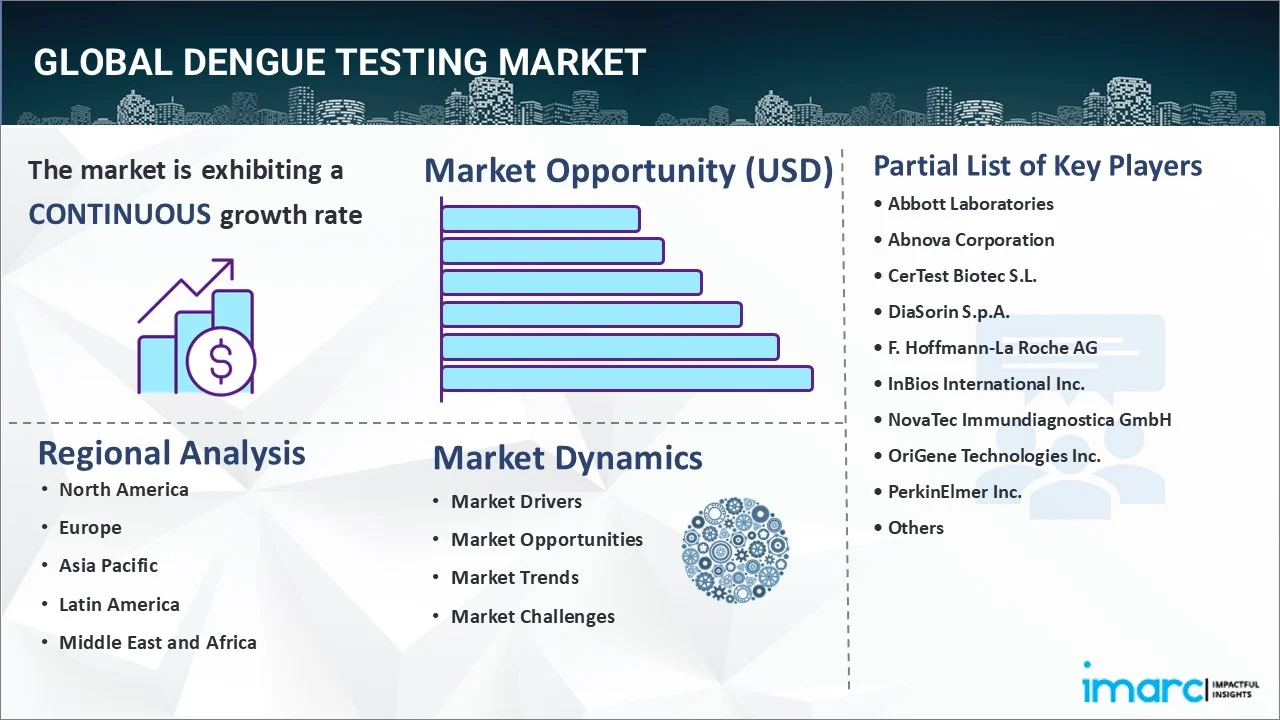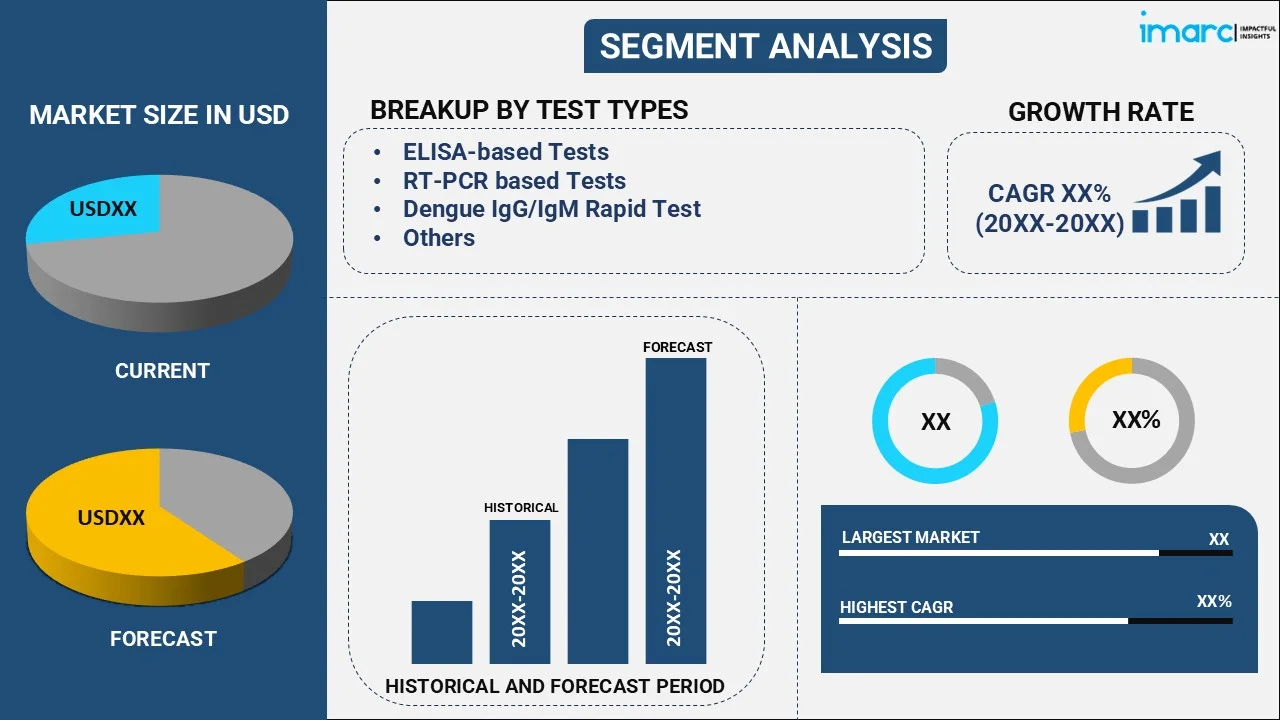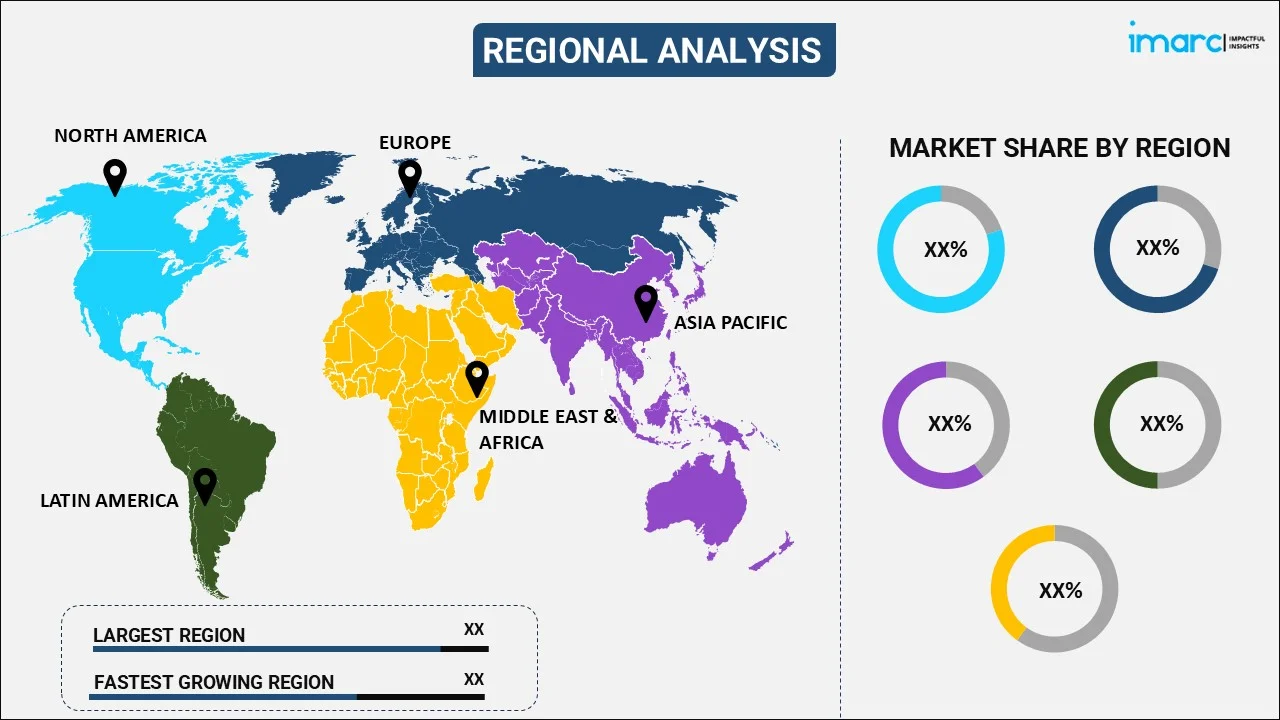
Dengue Testing Market Report by Test Type (ELISA-based Tests, RT-PCR based Tests, Dengue IgG/IgM Rapid Test, and Others), End User (Hospitals, Diagnostic Centers, and Others), and Region 2025-2033
Market Overview:
The global dengue testing market size reached USD 610.8 Million in 2024. Looking forward, IMARC Group expects the market to reach USD 911.7 Million by 2033, exhibiting a growth rate (CAGR) of 4.32% during 2025-2033. The market is primarily driven by the increasing dengue fever prevalence worldwide, advancements in diagnostic technologies, rising public health awareness, and government initiatives and funding in endemic regions across the globe.
|
Report Attribute
|
Key Statistics
|
|---|---|
|
Base Year
|
2024
|
|
Forecast Years
|
2025-2033
|
|
Historical Years
|
2019-2024
|
|
Market Size in 2024
|
USD 610.8 Million |
|
Market Forecast in 2033
|
USD 911.7 Million |
| Market Growth Rate 2025-2033 | 4.32% |
Dengue, also known as breakbone fever, is a viral infection that spreads through the bite of an infected Aedes aegypti mosquito. It causes ache in the joints and muscles, high fever, abdominal pain, vomiting, difficulty in breathing, clammy and cold skin, headache, pain behind the eyes, fatigue, rashes, and mild bleeding in the nose and gums. It is diagnosed via dengue testing, which includes enzyme-linked immunosorbent assay (ELISA), RT-PCR, and dengue IgG/IgM rapid tests. Dengue testing is performed by medical professionals using a blood sample to identify the different serotypes of the dengue virus.

Dengue Testing Market Trends:
Rising Dengue Incidence
The surge in dengue fever cases worldwide poses a substantial public health challenge, prompting intensified response efforts. According to the World Health Organization (WHO) reports of the 390 million dengue infections annually, 96 million show clinical symptoms. This spike is particularly noticeable in Asia and Latin America, where urbanization and climate change contribute to the spread of the Aedes mosquitoes that transmit the virus. Moreover, governments in these regions are thus compelled to enhance their epidemiological capabilities, focusing on monitoring and managing dengue outbreaks more effectively. Furthermore, the increasing incidence drives a corresponding demand for more extensive and effective testing and treatment facilities, highlighting the need for strengthened healthcare infrastructure to handle the growing number of cases efficiently.
Technological Advancements in Diagnostic Tools
The emerging technological advancements have vividly enhanced dengue diagnosis, thereby facilitating market growth. Additionally, the point-of-care testing (POCT) process offers rapid diagnosis and better accuracy in the dengue testing treatment area. Moreover, POCT devices provide key benefits by offering instant diagnostic results that are critical in areas where enhanced health infrastructure is limited. These tests are fast and convenient which enables quicker decision-making in the clinics and improves the response time to outbreaks. As these technologies evolve, they are becoming more user-friendly and cost-effective, which further drives their integration into mainstream healthcare practices globally. This trend improves patient care and significantly contributes to the control and reduction of disease spread by enabling timely interventions.
Supportive Government-Led Awareness and Diagnostic Programs
Government initiatives like India's National Vector Borne Disease Control Program (NVBDCP) develop strategic plan and roadmap to control dengue by enhancing awareness and expanding diagnostic capabilities. These programs increase the number of dengue tests conducted and improve the overall health system's preparedness and response to outbreaks. Moreover, by investing in healthcare infrastructure to manage dengue more effectively, these initiatives create a demand for advanced diagnostic tools and technologies. This increased focus on surveillance and diagnostics, supported by government funding, facilitates early detection and control of the disease, ultimately driving growth in the global market for dengue-related products and services.
Key Market Segmentation:
IMARC Group provides an analysis of the key trends in each sub-segment of the global dengue testing market report, along with forecasts at the global, regional and country levels from 2025-2033. Our report has categorized the market based on test type and end user.
Breakup by Test Type:

- ELISA-based Tests
- RT-PCR based Tests
- Dengue IgG/IgM Rapid Test
- Others
Breakup by End User:
- Hospitals
- Diagnostic Centers
- Others
Breakup by Region:

- North America
- United States
- Canada
- Asia-Pacific
- China
- Japan
- India
- South Korea
- Australia
- Indonesia
- Others
- Europe
- Germany
- France
- United Kingdom
- Italy
- Spain
- Russia
- Others
- Latin America
- Brazil
- Mexico
- Others
- Middle East and Africa
Competitive Landscape:
The competitive landscape of the industry has also been examined along with the profiles of the key players being Abbott Laboratories, Abnova Corporation, CerTest Biotec S.L., DiaSorin S.p.A., F. Hoffmann-La Roche AG, InBios International Inc., NovaTec Immundiagnostica GmbH, OriGene Technologies Inc., PerkinElmer Inc., Quest Diagnostics Incorporated and Thermo Fisher Scientific Inc.
Dengue Testing Market News:
- In August 2024, J Mitra & Company introduced the Dengue NS1 Antigen self-test kit, the first of its kind for home use in India. This kit enables individuals to perform the test autonomously at any chosen location and delivers results in 20 minutes through a rapid visual test, simplifying result interpretation. The kit effectively detects all four serotypes of the Dengue virus, known for its high sensitivity and accuracy. It falls under the category of Point of Care Test (POCT) and is designed for ease of use without the need for specialized training. The testing process involves placing a drop of blood into the sample well, adding a drop of assay buffer, and obtaining results within 20 minutes.
- On 12 September 2024, QIAGEN unveiled the broadening of its strategic partnership with Bio-Manguinhos/Fiocruz, the principal provider of vaccines and diagnostics for the Brazilian Ministry of Health. The expanded partnership now allows Bio-Manguinhos to introduce a sophisticated PCR-based molecular screening platform capable of detecting malaria in addition to HIV, and hepatitis B and C (HBV and HCV). This extension also enhances epidemiological monitoring of Brazil's prevalent dengue fever by implementing dengue molecular kits designed with exclusive chemistry developed jointly by QIAGEN and Bio-Manguinhos/Fiocruz. QIAGEN is set to deliver vital molecular biology technologies, tailored solutions, and extensive training to support Brazil’s public health efforts.
- In August 2023, Mylab Discovery Solutions launched two new rapid point-of-care tests for dengue, the rapid gold test and the high-accuracy dry luminescence assay test. These tests, which take only 15-20 minutes, can identify the stage and progression of dengue infections and do not require a laboratory environment. They are especially useful in areas with limited resources to aid in dengue screening efforts.
Report Coverage:
| Report Features | Details |
|---|---|
| Base Year of the Analysis | 2024 |
| Historical Period | 2019-2024 |
| Forecast Period | 2025-2033 |
| Units | Million USD |
| Segment Coverage | Test Type, End User, Region |
| Region Covered | Asia Pacific, Europe, North America, Latin America, Middle East and Africa |
| Countries Covered | United States, Canada, Germany, France, United Kingdom, Italy, Spain, Russia, China, Japan, India, South Korea, Australia, Indonesia, Brazil, Mexico |
| Companies Covered | Abbott Laboratories, Abnova Corporation, CerTest Biotec S.L., DiaSorin S.p.A., F. Hoffmann-La Roche AG, InBios International Inc., NovaTec Immundiagnostica GmbH, OriGene Technologies Inc., PerkinElmer Inc., Quest Diagnostics Incorporated, Thermo Fisher Scientific Inc., etc. |
| Customization Scope | 10% Free Customization |
| Post-Sale Analyst Support | 10-12 Weeks |
| Delivery Format | PDF and Excel through Email (We can also provide the editable version of the report in PPT/Word format on special request) |
Key Questions Answered in This Report
The dengue testing market was valued at USD 610.8 Million in 2024.
We expect the global dengue testing market to exhibit a CAGR of 4.32% during 2025-2033.
The rising demand for dengue testing for accurate and efficient diagnosis of dengue that assists in pathogenesis, clinical trials, outbreak control, academic research, vaccine development, etc., is primarily driving the global dengue testing market.
The sudden outbreak of the COVID-19 pandemic had led to the growing focus on the coronavirus infection testing across several nations, which in turn, is negatively impacting the global market for dengue testing.
Based on the test type, the global dengue testing market has been divided into ELISA-based tests, RT-PCR based tests, dengue IgG/IgM rapid test, and others. Among these, ELISA-based tests currently hold the majority of the global market share.
Based on the end user, the global dengue testing market can be segmented into hospitals, diagnostic centers, and others. Currently, diagnostic centers exhibit a clear dominance in the market.
On a regional level, the market has been classified into North America, Asia-Pacific, Europe, Latin America, and Middle East and Africa.
Some of the major players in the global dengue testing market include Abbott Laboratories, Abnova Corporation, CerTest Biotec S.L., DiaSorin S.p.A., F. Hoffmann-La Roche AG, InBios International Inc., NovaTec Immundiagnostica GmbH, OriGene Technologies Inc., PerkinElmer Inc., Quest Diagnostics Incorporated, and Thermo Fisher Scientific Inc.
Need more help?
- Speak to our experienced analysts for insights on the current market scenarios.
- Include additional segments and countries to customize the report as per your requirement.
- Gain an unparalleled competitive advantage in your domain by understanding how to utilize the report and positively impacting your operations and revenue.
- For further assistance, please connect with our analysts.
 Request Customization
Request Customization
 Speak to an Analyst
Speak to an Analyst
 Request Brochure
Request Brochure
 Inquire Before Buying
Inquire Before Buying




.webp)




.webp)












